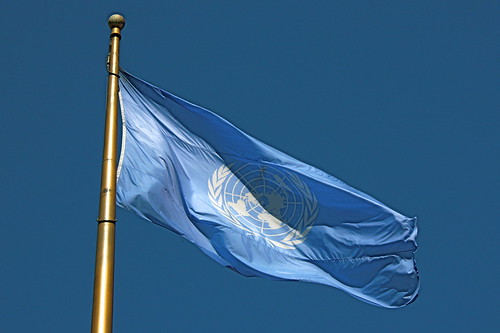When you don't see first hand the detriment of gun crime, it can be difficult to gauge the scale of the problem. It's like all of the television commercials about poverty in third world countries - it can be simple to switch off when you can't relate. The key to overcoming this sort of apathy is to become aware.

Photo by scazon.
The United Nations: It's an international organization, founded in 1945, comprised of 192 member states (see full list here). These member states have agreed to accept and uphold the obligations of the Charter (view the charter here). In brief, the UN does not make laws, what it does do is provide a global body that works towards "solve[ing] problems that challenge humanity" (source). The UN has a focus on peacekeeping, development and human rights. You can learn lots more about the United Nations at the official UN website.
General Assembly (GA): The GA provides a forum for the 192 member states to discuss and make recommendations on the issues outlined in the Charter of the United Nations. For a more detailed outline of the functions and powers of the General Assembly, click here.
First Committee - Disarmament and International Security Committee: This is a committee within the General Assembly at the United Nations. It deals with issues surrounding international security and disarmament ("the act of reducing, limiting, or abolishing weapons" source)
Treaty: A treaty, in the context of the United Nations, is a binding agreement that the UN member states can opt to sign and uphold.

Image by JimBowen0306.
Arms Trade Treaty (ATT): An ATT was first addressed in the UN in 2006. Since then, diplomats have been discussing this potential treaty. Also since then, 2.1 million people have died, that's 2000 a day, as a result of armed violence (source).
The ATT is about regulating the conventional arms trade. There is presently no international regulation standard governing the import, export and transfer of conventional arms. This means that conventional weapons, like guns, that are intended for military purposes end up in the hands of criminals and other human rights abusers. These weapons are used to kill and maim civilians, as well facilitating the narcotics trade and other crimes such as armed burglary and rapes. This sort of criminal activity at the hands of conventional weaponry holds direct links to lack of development, which in turn makes for economic underdevelopment and poverty.
A key focus of an ATT would be on Risk Assessment - where are these weapons going? For what purpose? Does the end user have a history of negligent use of weaponry?
In 2006, 153 of the UN member states voted in favour of Resolution 61/89, a document that set out to achieve support on implementing an common international standards for the conventional arms trade (view Resolution 61/89 in full). 24 countries chose to abstain from voting (these counties included: Bahrain, Belarus, China, Egypt, India, Iran, Iraq, Israel, Kuwait, Laos, Libya, Marshall Islands, Nepal, Oman, Pakistan, Qatar, Russia, Saudi Arabia, Sudan, Syria, UAE, Venezuela, Yemen, Zimbabwe (source). Only 1 country voted against the resolution, that country was the United States.
For more information about why an Arms Trade Treaty is needed urgently, watch the short video below:
For a more in depth look at the reason an Arms Trade Treaty is required, download the Oxfam report 'Dying for Action' (pdf).
Labels: big issues, important stuff, life in general, social justice
1 Comments:
- At 31 January 2010 at 20:01 , miss morgan potts said...
-
The UN could potentially play a key role in the global governance reform that we desperately need. There are problems that the industrialised, Western countries cannot solve alone: climate change, arms trade, terrorism, human rights violations, disparities in wealth, water poverty... the list continues. The world needs a unified body, and that could be the UN, if there was truly collective action and enforcement of the treaties. As it stands treaties are optional, and violation of treaties is largely unpunished. Should these problems be addressed, there is real capacity for change and progress.
Subscribe to Post Comments [Atom]







 Kate is the 23 year old Australian web editor behind treslola.com (and
Kate is the 23 year old Australian web editor behind treslola.com (and 










Post a Comment